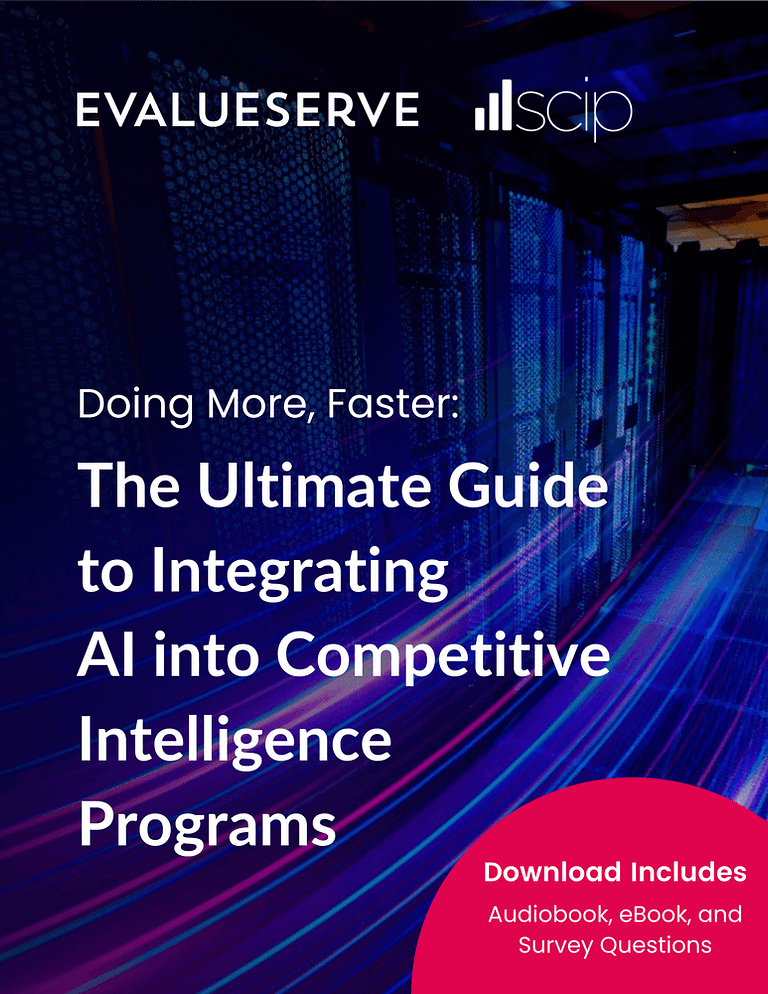Competitive Intelligence: An Overview
All businesses want a competitive edge. It’s hard to get one, and it’s harder to maintain one.
The rate of business competition is increasing and disruption is happening at a faster pace than ever before. 63% of companies are currently experiencing disruption, and 44% are highly susceptible to it, according to research by Accenture. And in an analysis of publicly listed companies, Innosight found that only 3%, had made material progress in strategically transforming their organizations.
Competitive Intelligence helps market leaders see over the horizon and base their business strategy on data-backed predictions on the market.
Competitive intelligence gives you the ability to capture, analyze, and act on intelligence related to your business’s competitive landscape. This intelligence can encompass anything and everything with respect to your competitive landscape – market, products, supply chain, etc. Simply put, competitive intelligence is the constant monitoring of the forces that impact your ability to build and maintain a competitive edge.
For a company to gain a competitive advantage, all teams in your company need specific and actionable intelligence relevant to their job function.
Elements of Competitive Intelligence
Competitive Intelligence is intended to give companies a competitive edge in the market. For a company to truly gain a competitive edge, all their teams need access to intelligence that’ll impact them so they can adjust and respond and improve their division.
While many think of competitive intelligence initially as competitor intelligence – meaning just tracking your competitors – there is a lot more that you need to track to get comprehensive competitive intelligence and move your business forward.
Let’s take a look:
|
Procurement | Sales | ESG | Innovation | Product | Supply Chain |
||||||
|
Market |
||||||
|
Industry |
||||||
|
Sector |
||||||
Sector Intelligence
Sector intelligence tracks what is happening in large groups of companies. Sectors are created by grouping companies with similar primary business activities like Health Care, Financial, Information Technology, Communications, etc. It looks at large-scale economic shifts and changes for these categorical companies.
Given each sector has unique characteristics and a different risk profile, sector intelligence provides access to these trends.
Commonly, consultants and investors at management, advisory, or investment firms will use sector intelligence at least weekly to help them make key recommendations.
For example, investment banks need to make buy/sell decisions rapidly. Sector intelligence plays a key role in making that decision since stocks tend to follow the performance of their relative sector.
Similarly, advisory firms provide knowledge-based services and recommendations. Commonly, they work with businesses going through very difficult times such as bankruptcy. Partners at these firms need up-to-date sector intelligence to first sell their expertise to the companies but also to make these critical recommendations that play critical roles in the future of a company.
Market Intelligence
Market intelligence is information collected on your entire market. A market is a bit more specific than industry as it’s the place where buyers and sellers meet. Market intelligence helps shine a light on position, competitors, customers, growth opportunities and current or future problems a company could face. These insights help partners identify and design a competitive strategy for the company’s products and services.
Businesses face many challenges as they navigate the landscape of a B2B market or a B2C market. Market Intelligence is an important practice that needs to be regularly tracked to effectively conduct their business, close deals, and remain competitive in their industry.
Some challenges that businesses might face that would lead to the need for market intelligence include:
- A lack of understanding of the customer’s needs
- Expansion into new or existing markets
- Evaluating your current product and competitor products
- Identifying the strengths and weaknesses of competitors so you can adapt your product or services to provide more value than your competitor’s
Market Intelligence can provide better insights on customers and market needs to strengthen the position of the organization, products, or services across various channels. It can provide direction of where your company can attribute more resources to meet SMART goals, tap into new target markets, and identify trends among your consumers, competitors, and other stakeholders.

Forrester Research Named Evalueserve's Insightsfirst a Strong Performer
Competitor Intelligence
Competitor Intelligence is focused on understanding the movements and decisions of competitors in your industry.
It is meant to track how your competitors are developing products, selling services, marketing, winning sales deals, and the overall competitiveness of other businesses within your industry or landscape. It also gives you a comparison of your products and services vs. competitors.
It is critical for every team to understand and track what the competition is doing with their coinciding department and how it is impacting their business, the market, consumers, etc.
Competitor Intelligence can be especially useful for marketing and sales teams to understand how competitors are marketing their own products and services and winning deals with prospects that you might have been targeting.
The need for Competitor Intelligence arises as competition is increasingly getting more difficult. Understanding your competitors’ overall strategy for winning deals in your landscape can help your sales, marketing, product, and other departments combat the strategies of your competitors and ultimately bring in more revenue for the business.
Challenges such as understanding where you place in the market, how you can win new customers, and how you can keep loyal customers can all lead your business to gather competitor intelligence.
Competitor Intelligence is important to the success of your business so you can remain competitive in your industry and potentially stay ahead of the curve. With competitor intelligence, you research what your competitors are doing, monitor their movements, and create strategies to combat them so that you can improve the overall competitiveness of your business, meet the needs of your customers and prospects, and close more deals.
Competitor Intelligence helps different teams within a business understand how counterpart teams working for a competitor manage their movements and business decisions. It’s important because it can identify how marketing teams are adapting their messaging, sales teams are adapting their strategies, and product teams are developing or refining products.
Innovation Intelligence
Disruption describes a process whereby a smaller company wither fewer resources can successfully challenge established incumbent businesses.
Innovation intelligence is the process of solving problems by discovering and combining ideas and methods in new ways.
To grow and evolve to ever-changing markets, all businesses need intelligence on innovation to gain early-market advantage and stay competitive.
Innosight Research found that the average tenure of a company on the S&P 500 Index decreased 38% in the past 50 years and it continues to shrink. This is because companies are failing to innovate and keep up with changing consumer preferences.
Whether your business is an incumbent or disrupter, Innovation Intelligence is essential to your success.
- Incumbent businesses benefit from tracking disruptors in the market to enable their teams to innovate new products and services or improve current products and services.
- Disruptors benefit from innovation and disruption intelligence to understand where there are holes in the market that they could fill and find where less-demanding customers are unsatisfied with incumbent businesses.
One of the challenges that lead to innovation and disruption is the overextension of a business. Some incumbents overextend their business beyond their reach. This leads to some customers receiving less attention than other high-ticket customers. Innovators and disrupters in the market can identify customer pain points and offer better solutions.
Innovation and Disruption Intelligence is the essence of a competitive environment that enables incumbent businesses to further develop their products, and it enables industry disruptors to find holes in the market that have yet to be filled or create their own market to address new problems faced by consumers.
It helps businesses address rapid changes in customer behavior, the influx of competitors from different industries trying to expand their reach, identify needs for new offerings, and change their sales model to remain competitive in their respective markets.
Sales Intelligence
Sales intelligence is the use of data and software to help salespeople focus their effort on buying ready accounts, generate leads, create customer profiles, better manage their data, and more. Businesses change daily and sales need tools that constantly monitor them.
Too often sales teams are running one campaign per quarter are focused on accounts that don’t have a current need. Sales Intelligence monitors the market constantly for triggers that indicate buyer readiness. It also provides research on key accounts for personalized and relevant outreach.
Notably, battle cards are incredibly popular – especially for SaaS sales. Battle cards give reps the info they need when competitor objections come up on calls so they aren’t caught off guard.
Procurement and Supply Chain Intelligence
Procurement and Supply Chain Intelligence is the process of gathering and analyzing information relevant to your supply and vendor contracts which helps you confidently make decisions in sourcing and category management.
This type of intel gives you insight into:
- Supply and demand figures
- Costs of production
- Competitive sale price
- Storage Costs
- Regulatory and taxation risk/costs
- Material supply intel
- Vendor/Partner Breakdown
Essentially, supply chain intelligence constantly monitors what’s happening in the market to inform what rate of production is required based on demand, where is the best place to manufacture/store, and what your costs vs sale price is so you’re producing what the market wants and come out profitable to give you that bigger competitive edge.
The mid-term challenge for sourcing teams are commodity and category inflation. The quantitative easing measures applied by many central banks, coupled with commodity demand increase due to recovery, are expected to lead to cost inflation across several categories. Procurement teams will need to anticipate that, forecast it in the relevant categories, plan for it, and manage it appropriately.
In the long-term, this function is poised to be disrupted through newer technologies and business models. Technologies such as block-chain and business models like Amazon B2B are just a few examples of what companies are experimenting with. The disruptions arising from these models have the potential to transform different parts of the sourcing value chain.
– Vishal Suri, Associate VP and Solutions Architect of Corporates and Professional Services, Evalueserve
Procurement and supply chain intelligence is important in giving a company a competitive edge because it helps procurement and supply chain teams identify ways to save money and reduce the risk for the organization. It also helps achieve benefits like improved credibility, risk monitoring, trend identification, and supplier identification.
ESG Intelligence
Environmental, Social, and Governance (ESG) Intelligence is focused on understanding the impact your business practices have on the environment, social issues, and government relations.
It tracks your environmental footprint, where your industry and competitors are headed with sustainability, and the environmental impact. Social welfare and other humanitarian efforts competitors are making, and relationships with foreign and national governments.
ESG Intelligence is important for businesses to adapt their business to shifting attitudes about environmental, social, and government relations. As other businesses adapt their business models, customers demand more ESG impact, and the landscape adjusts to becoming more sustainable, it’s important for businesses to track these changes so they can adapt faster than their competitors and lead the change that consumers appear to be demanding.
Businesses cannot ignore ESG and ESG Intelligence allows them to stay on top of the changes happening.
Insightsfirst, Evalueserve’s AI-enabled competitive and market intelligence platform, can help you with all 7 elements of competitive intelligence.
Forrester Research Named Evalueserve's Insightsfirst a Strong Performer



